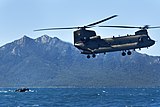Australian Army
The Australian Army is the principal land warfare force of Australia, a part of the Australian Defence Force (ADF) along with the Royal Australian Navy and the Royal Australian Air Force. The Army is commanded by the Chief of Army (CA), who is subordinate to the Chief of the Defence Force (CDF) who commands the ADF. The CA is also directly responsible to the Minister for Defence, with the Department of Defence administering the ADF and the Army.[4]
Australian Army
1 March 1901
28,524 (Regular)
15,711 (Active Reserve)[1]
"The Army March"
Governor-General David Hurley as representative of Charles III as King of Australia[3]
Formed in 1901, as the Commonwealth Military Forces, through the amalgamation of the colonial forces of Australia following the Federation of Australia. Although Australian soldiers have been involved in a number of minor and major conflicts throughout Australia's history, only during the Second World War has Australian territory come under direct attack.
The Australian Army was initially composed almost completely of part–time soldiers, where the vast majority were in units of the Citizens Military Force (CMF or Militia) (1901–1980) during peacetime, with limits set on the regular Army. Since all reservists were barred from forcibly serving overseas, volunteer expeditionary forces (1st AIF, ANMEF, 2nd AIF) were formed to enable the Army to send large numbers of soldiers to serve overseas during periods of war.[5][6] This period lasted from federation until post–1947, when a standing peacetime regular army was formed and the Australian Army Reserve (1980–present) began to decline in importance.[7][6]
During its history, the Australian Army has fought in a number of major wars, including the Second Boer War, the First and Second World Wars, Korean War, Malayan Emergency, Indonesia-Malaysia Confrontation, Vietnam War,[8] the War in Afghanistan (2001–2021) and the Iraq War.[9] Since 1947, the Australian Army has also been involved in many peacekeeping operations, usually under the auspices of the United Nations. Today, it participates in multilateral and unilateral military exercises and provides emergency disaster relief and humanitarian aid in response to domestic and international crises.
Personnel[edit]
Strength[edit]
As of June 2022 the Army had 28,387 permanent (regular) members[94] and 20,742 reservists (part-time);[95] all of whom are volunteers. As of June 2022, women made up 15.11% of the Army, with a target set for 18% 2025.[96] Gender based restrictions for frontline combat or training roles were lifted in January 2013.[97] Also as of June 2022, Indigenous Australians made up 3.7% of the Army.[98]
Australian Army Journal[edit]
Since June 1948, the Australian Army has published its own journal titled the Australian Army Journal. The journal's first editor was Colonel Eustace Keogh, and initially, it was intended to assume the role that the Army Training Memoranda had filled during the Second World War, although its focus, purpose, and format has shifted over time.[127] Covering a broad range of topics including essays, book reviews and editorials, with submissions from serving members as well as professional authors, the journal's stated goal is to provide "...the primary forum for Army's professional discourse... [and]... debate within the Australian Army... [and improve the]... intellectual rigor of that debate by adhering to a strict and demanding standard of quality".[128] In 1976, the journal was placed on hiatus as the Defence Force Journal began publication;[127] however, publishing of the Australian Army Journal began again in 1999 and since then the journal has been published largely on a quarterly basis, with only minimal interruptions.[129]




